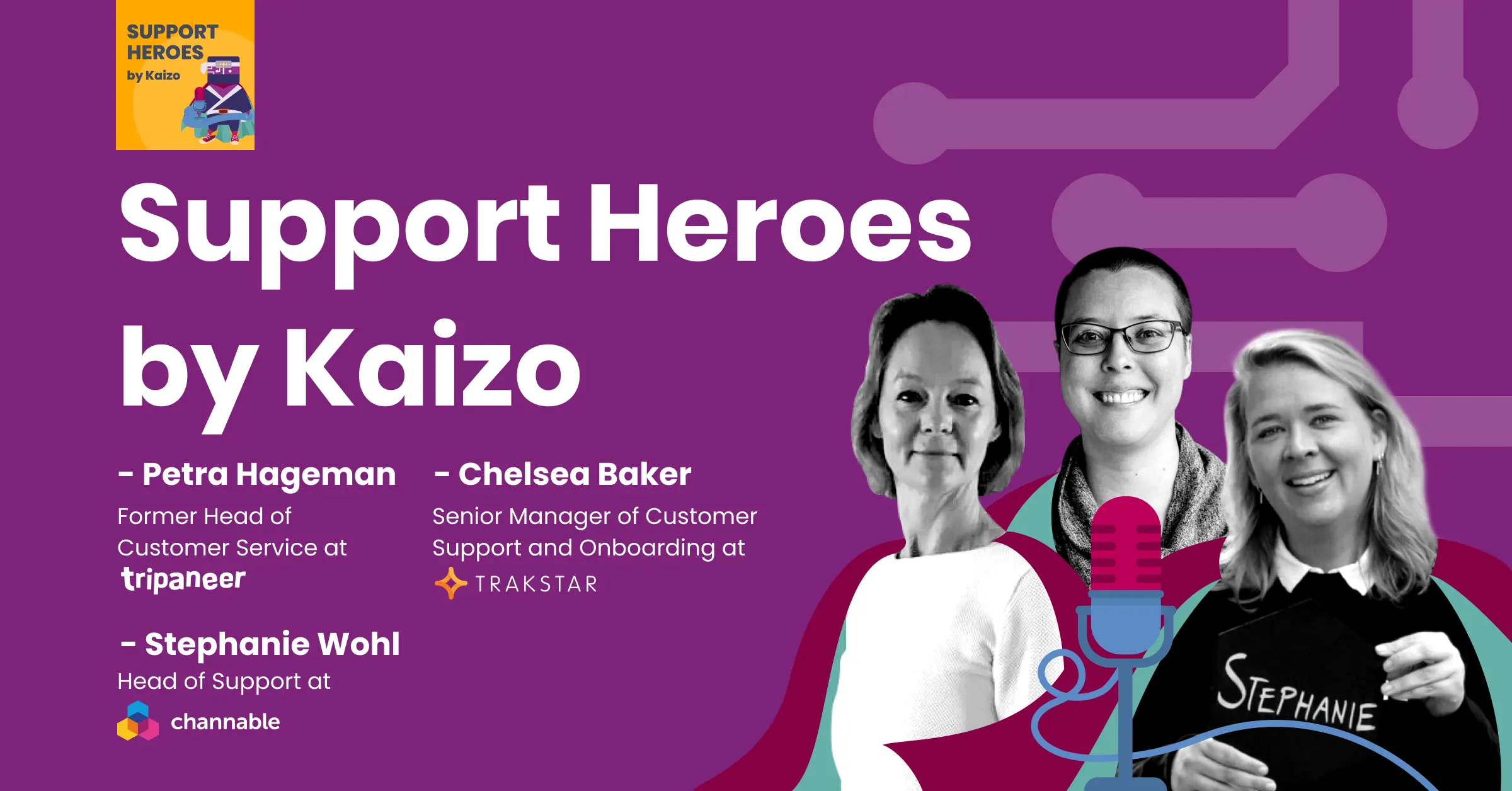Click ‘subscribe’ in the bottom right of the player to listen or download from Apple Podcast, Spotify, Google Podcast, and Amazon Music.
The thirty-first episode of Support Heroes by Kaizo, featured Petra Hageman- former Head of Customer Service at Tripaneer, Chelsea Baker- Senior Manager of Customer Support and Onboarding at Trakstar and Stephanie Wohl- Head of Support at Channable.
Together these three seasoned customer service managers share their best practices from more than 4 decades of combined experience. The conversation touched on hiring, culture, management structure, communication and much more. Following are a selection of the top tips from the episode.
Limit the number of agents per customer service manager
- When growing and/or scaling a department it’s important to grow the number of customer service managers along with the number of agents. The reason: agents need to be supported with 1:1s, reviews, training and operation resources in order to succeed. Setting agents up for success takes time and attention.
- For departments that are still growing, our experts advised giving each customer service manager a maximum of 10 full-time employees to oversee. This is so that the manager has enough time to provide the agents with everything they need while also having time for other tasks. Such a manager is also commonly referred to as a team lead.
“10 full-time employees under one person is enough…” – Stephanie Wohl
- However, for large departments with a robust structure, such as the 2000+ person department that Petra managed at Booking.com, team leads/frontline customer service managers are able to oversee 15-20 agents. But why?
- As there are more managers in larger departments, team leads often take on fewer operational tasks. Having such duties and tasks taken care of, allows team leads to solely focus on supporting the agents in their team. In smaller departments, there are fewer managers, so there’s more shared work in addition to supporting agents.
What to look for when hiring a customer service representative
“I can teach you how to use our product but I can’t teach you how to be empathic by nature or be continuously curious and wanting to learn” – Chelsea Baker
- Some things need to be present in a candidate when hiring for customer service. For example, responding well to stress, being receptive to feedback or being self-reflective. In our third episode, Petra mentioned the number one characteristic she looks for is having a ‘customer service heart’. This means naturally possessing the empathy and communication skills necessary to provide good customer service.
- Nevertheless, people can improve rapidly in many things, regardless of talent or natural ability. Why is it then so important for new hires in customer service to possess certain attributes? If a candidate has other positives but lacks a customer service heart, is it really ill-advised to hire them?
- Our experts answer ‘yes’. Primarily because customer support is stressful and during peak times of stress, people often resort to their most natural habits. This is why, when hiring in customer service, managers should look for agents with a natural tendency to be empathic, polite and service-orientated.
“You can teach soft skills until a certain point but in a stressful situation, you want people to have a natural instinct to serve” – Petra Hageman
- To see whether someone has these skills, ask for an example of their behaviour and intentions in certain situations. Chelsea suggests asking a candidate to describe how and why they bought a certain gift for someone. To see if they thought primarily about satisfying the other person or satisfying something with regard to themselves.
Create a list of customer service values
- Customer service values are very similar to company values but are specific to the customer service department. If your company has defined a set of values, adapt them to specifically guide the service team. The first benefit of doing so is related to the previous tip: hiring for personality fit is easier with defined customer service values.
“It’s very important to match the personality [of a new candidate] with the company [or department] values…it’s much more important to hire someone who feels at home in the company than looking at just skills” – Petra Hageman
- The second benefit to defining values for the customer service team is that decision making is made easier. If a decision is complex and the right answer is not clear, going back to agreed values and using them to move forward creates more buy-in from the team. To develop the values, source information from the team and take constant feedback on them. At Channable they apply an ongoing process to ‘test’ the values in the eyes of the employees. How the values affect them is what matters most.
- Finally, having values makes measuring performance easier and fairer. This goes for managers and agents alike. For example, one of Channable’s values is ‘own it’. Within support, this means employees own their interactions with customers and take responsibility for their communication both internally and externally. Having the value ‘own it’ makes it easier for the team to truly match themselves to this standard.


